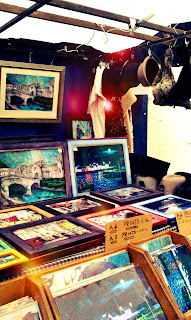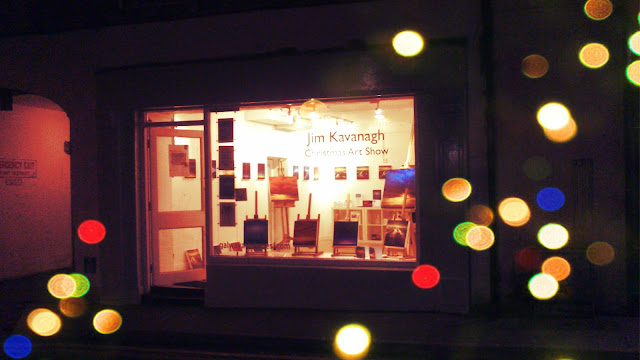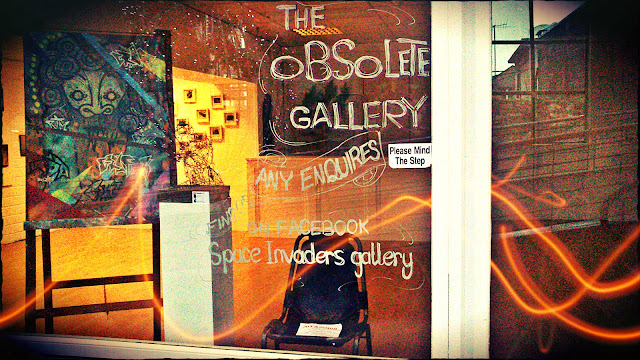I've been doing some field
research over the past few weeks into the life of the artist turned
constant job hunter. My working life is now a set of revolving doors.
I've worked for two different businesses, been ejected from both
since, and dumped many many CVs upon the populace since I've returned to Galway and ran up a lot of rent and bill debt.
I consider myself a piece of sea foam floating on the turbluent seas
of minimum wage employment. This is part of my
overall research into
how to make money as an artist in Galwayand the realities of
an artist trying to make it in the recession. As well as being..well,
reality.
I have established the two Ugly and
Unavoidable Realities that must be dealt with when you first decide
to become an artist. Very simply, once you recognise and overcome
them both, you'll be flying. They are:
1. Wanting to be an
artist.
2. Having the support to be an artist.
With regards to point
no.; if you're a typically sensitive artist with low self-esteem,
self-belief and out-in-out poor self-motivation, you can watch a lot
of videos like
this and
this, read a lot of inspirational quotes like
this and
this, get all pumped up, black out the ever-present
Nay-sayers, and be sent, battle-crying, to your Wacom tablet. It can
take months, years, even decades, to get beyond this point of
self-doubt (thanks education system).
 |
| Got to lending one of these and it has solved all art material and art technology mental-block problems. Every artist should have one. |
However, once you finally
start to feel good about your own ability as an artist and commit
yourself to the most Difficult Job in the World (because, let's face
it, you know you couldn't
be happy any other way), Reality no. 2
emerges. You realise that the rest of the world demands, without fail, a consistent
weekly cheque from you. The rest of the world being; the banks, the
landlords, the telecommunications and electricity companies,
specsavers, etc. The brand new artist does not get a weekly check from their imaginary art boss. You're reading
inspirational Zen Pencils comics to
get you in the arty zone one minute and then you're forking over the last coins in your wallet to print out
dozens of CVs the next so you can pay for the UPC bill. Joining the
nearest self-sufficient artist-atelier in Paris as the next logical
step just isn't a viable option for the artist these days.
Because...you know...we live in the real world and not an art history
book.
The economy does not have
an Artist Entry Route with a form to fill out and certificates to
collect so that you can be granted access into the Art Market, earn a
weekly wage and pay your weekly living expenses for various state
services and general exisitng costs. There are enough pressures out
there from the likes of Conservative Parents, Rubbish Critical Peers
(who are all jealous of your commitment to The Dream) and the
Conventional Education System telling you to go back to college/get
that masters/get a job with KPMG etc. without having to live in a
stressful and terrifying hand-to-mouth world for an undetermined
length of time. A new artist doesn't need to this myriad of voices
telling them to stop before they've even begun on top of an economy
that appears to not want their economic contribution (no matter how
much
it might actually need you).
In order to face this
Reality no.2, I like to regard the survival plan in two ways – you
can go public or you can go private. You can sign up for the
financial security offered by the state in the form of job seekers
allowance or you can hack it in dirty world of private industry, i.e.
Perusing the Visual Artists Ireland website for gallery submission
ads by day, very very slowly building up your reputation and
portfolio, and working in lots of call centres and pubs by night
until your sales on Etsy start to break even (which it took you about 2 months to set up because you were so busy working). Then you can maybe
consider moving to art full-time, after a term of employment long
enough and terrible-manager-less enough to accumulate some capital.
Obviously the greatest
problem I have with the private solution (which also happens to be my
area of “research”) is the obvious lack of security when you're
truly expendable (and when your manager thinks you have no knowledge
of labour laws. Or human rights.). You have a lot of work to do as an artist.
Especially at the beginning (by beginning I mean the day you overcome
Reality no.1). You are an entrepreneur as well as a craftsperson. You need to manage your precious time, build up
contacts, publicise yourself endlessly, be in a constant state of
learning and upskilling, generally learn to business, and of course,
make the art.
Working in a minimum wage job has
certain benefits to
an artist: you have contact with non-artists, which is good for the
soul, staving off solitude, and finding someone whose auntie might like a
painting of their cat. You earn more money than if you go public. You get richer faster - more materials, more courses, more travelling, more peace of mind. “Keeping the day job” is regarded as
essential to being a working artist by some (see Austin Kleon's
advice and Hugh McLeod's
list (scroll down to no. 7). A dual-life or artist/barista or artist/teacher or
artist/dog groomer is an important daily mental exercise for many, like tuning in
and out of both sides of your brain to maximise efficiency and
creativity. And for others (like myself), it can leave you totally
work-drained. Even when the creative synapses are still firing and
crying out for an outlet, your poor little hands are limp and covered
in ground coffee stains.
Here is the public option
outlined - Signing-on to the dole. Which can take months. After
you're on, your weekends are spent fastidiously filling out forms and
generally chasing more various avenues of artist funding, from the
artscouncil and from intiatives from your local county council (again
hounding the
adverts on Visual Artists, what a website). Some day,
after fighting apathy and the temptation to sleep in until 2pm every day, you might just be able to
develop your own sense of entrepreneurship and make your
own
money, save for a mortgage, and earn independence.
Here's two of my favourite pages from an
online comic I got to reading years ago. I highly reccomend it. After a couple of years of burger-flipping, courier-ing, and being a masseuse, and surviving the
humiliation of abject poverty in Montreal as a Fine Arts Graduate in
Ceramics, Liliane attempts to begin her own freelancing illustration
business. Naturally enough, she runs into financial
difficulties immediately and is encouraged by her friends to overcome her prejudices about social benefits, having worked hard all her life to make ends meet:


Jen Hesnan is an arts
facilitator who has her foot firmly into the broader Community Arts
network, who runs the GALCA Galway Community Arts facebook group (find it and join it RIGHT NAO), has
some great words about not only the artist's inevitable and logical
dependence on the public sector, but their necessary direct contribution to
it, community arts and arts facilitation through community-focused
programmes being her forté. Putting an artist in a community role is
a no brainer when you think about it. Doesn't it make sense for an
artist, whose job is to make art that makes people happy, should be
repaid by the community they enrich through designated public
funding? In theory?? In particular, the much maligned Jobbridge
scheme can actually offer a three-pronged benefit to the starter artist – they can get connected to a community, make both arts and
non-arts-sector contacts (rather than be a recluse waiting for their
millionaire to ride in the door on a winged unicorn or only make friends with grumpy coffee merchants) and they can
produce art in a genuine art-career setting. You are officially in the arts
sector
and you don't have to move back in with the parents who live in Ballynowhere, Co. Isolated ! This is after the appropriate training of course, especially if you're going to be assisting in areas like art therapy or
art and health promotion.
Jobridging with an arts
organisation or general youth organisation is an option I had never
really considered, being so focused on getting the profession of artist on an equal
setting to other professions (which isn't necessarily...necessary or
realistic, as the more research I do reveals). Arguably, this solution is even
more effective with keeping in touch with the outside world through
the non-arts sector “day job”.
What have I decided to do?
Well, I like the idea of the Artist Dual Role and, 2013 being the
year of following life-long dreams and all that, I'm trying my hand
at a new trade that will satisfy the tech itches, the design itches,
and the start-up business-mania fascnation itches – Web Development. It's time to get serious about making the blog look good (I'm thinking that teal is a nice signature colour). I
think that getting a better understanding of the basis of the tech
market, the apparently most thriving industry in Ireland for now,
would be great to examine non-conventional careers for the art grad.
Also I found this
article, amongst others from TechCrunch, a few days ago and squeeee-d everywhere.
 |
| It is a glorious new world. |
Aditionally, I could always make artist portfolio websites for the
artist list myself. Gathering the Galwegian artists together on an internet platform is proving...challenging.
To conclude, here is a brilliant
video about being a writer in Galway on the dole, by Julian Gough and Olaf Tyaransen.
"In a way, our generation was quite lucky, in
that we didn't have the option of work...if you could keep your overhead
low enough, you could explore culture; you could read, you could go to
the library, you could find out what you wanted to do with your life. It
was actually quite a luxury."






































.jpg)













